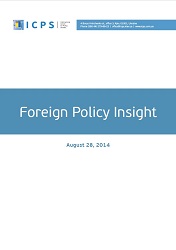
Foreign Policy Insight, Issue 2014 - 01 Responding to the Russians
Foreign Policy Insight, Issue 2014 - 01 Responding to the Russians
Keywords: Energy issues; the annexation of the Crimea;
Meeting in Minsk // Merkel’s visit to Ukraine
More...
Keywords: Energy issues; the annexation of the Crimea;
Meeting in Minsk // Merkel’s visit to Ukraine
More...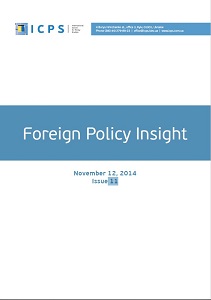
Keywords: Crimean Tatars; the Russian-Ukrainian conflict; Civil war in Syria; Nagorno-Karabakh conflict; Turk Stream;
Turkey: a friend, a partner, a competitor?
More...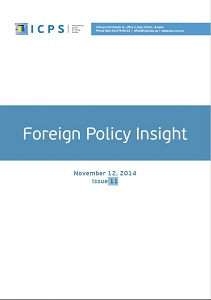
Keywords: “Russian world”; Conflict between Ukraine and Russia; Common threat;
Ukraine and Belarus: attempts to elaborate common positions against a backdrop of the Russian-Ukrainian conflict
More...
Keywords: Polish-Ukrainian relations; Russian-Ukrainian conflict; Economic development;
Ukrainian-Polish affairs: challenges and opportunities
More...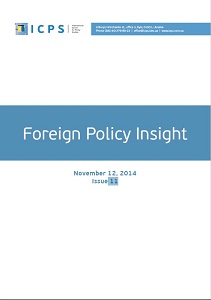
Keywords: European integration; Visa-free regime; The Association Agreement;
Ukraine-EU Summit: What will save European integration of Ukrane?
More...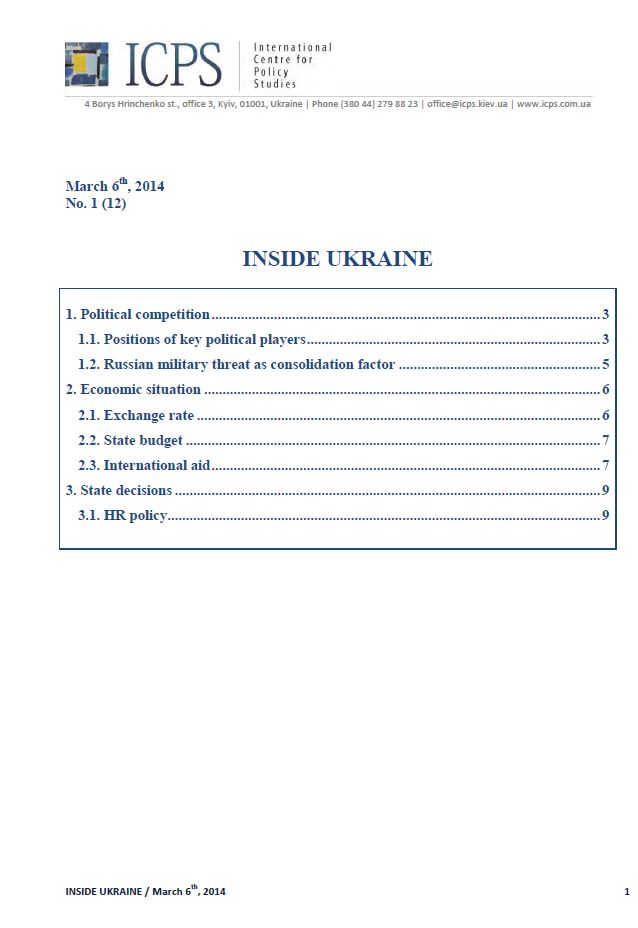
1. Political competition // 1.1. Positions of key political players // 1.2. Russian military threat as consolidation factor // 2. Economic situation // 2.1. Exchange rate // 2.2. State budget // 2.3. International aid // 3. State decisions // 3.1. HR policy
More...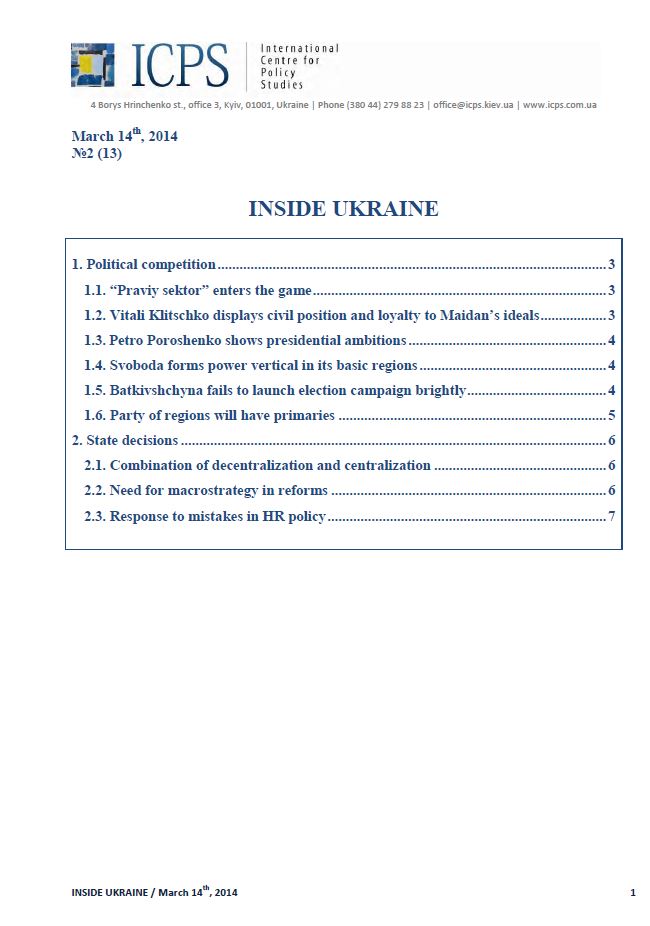
1. Political competition // 1.1. “Praviy sektor” enters the game // 1.2. Vitali Klitschko displays civil position and loyalty to Maidan’s ideals // 1.3. Petro Poroshenko shows presidential ambitions // 1.4. Svoboda forms power vertical in its basic regions // 1.5. Batkivshchyna fails to launch election campaign brightly // 1.6. Party of regions will have primaries // 2. State decisions // 2.1. Combination of decentralization and centralization // 2.2. Need for macrostrategy in reforms // 2.3. Response to mistakes in HR policy
More...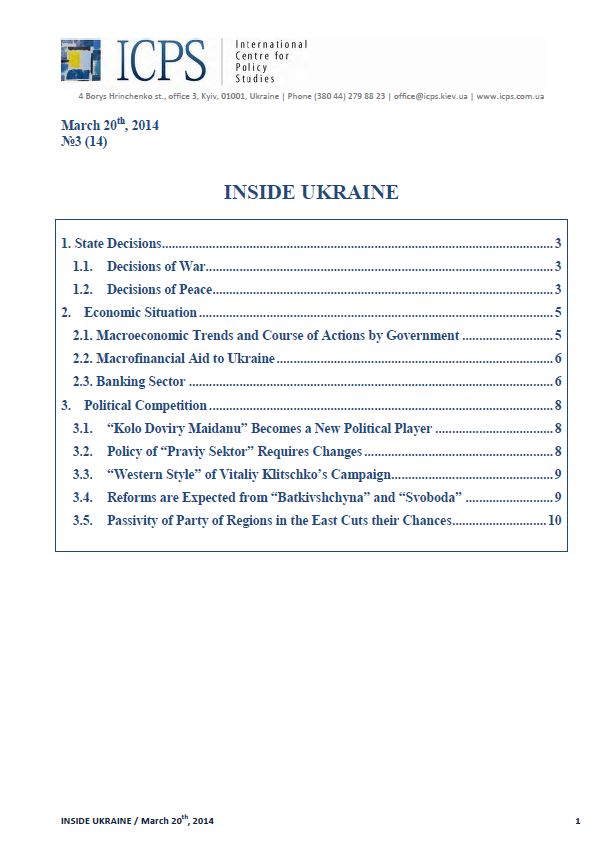
1. State Decisions // 1.1. Decisions of War // 1.2. Decisions of Peace // 2. Economic Situation // 2.1. Macroeconomic Trends and Course of Actions by Government // 2.2. Macrofinancial Aid to Ukraine // 2.3. Banking Sector // 3. Political Competition // 3.1. “Kolo Doviry Maidanu” Becomes a New Political Player // 3.2. Policy of “Praviy Sektor” Requires Changes // 3.3. “Western Style” of Vitaliy Klitschko’s Campaign // 3.4. Reforms are Expected from “Batkivshchyna” and “Svoboda” // 3.5. Passivity of Party of Regions in the East Cuts their Chances
More...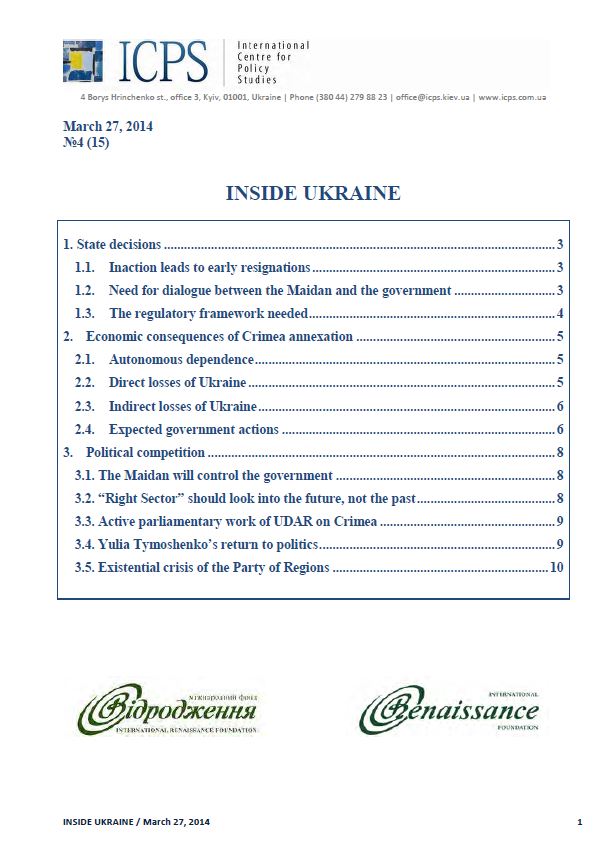
1. State decisions // 1.1. Inaction leads to early resignations // 1.2. Need for dialogue between the Maidan and the government // 1.3. The regulatory framework needed // 2. Economic consequences of Crimea annexation // 2.1. Autonomous dependence // 2.2. Direct losses of Ukraine // 2.3. Indirect losses of Ukraine // 2.4. Expected government actions // 3. Political competition // 3.1. The Maidan will control the government // 3.2. “Right Sector” should look into the future, not the past // 3.3. Active parliamentary work of UDAR on Crimea // 3.4. Yulia Tymoshenko’s return to politics // 3.5. Existential crisis of the Party of Regions
More...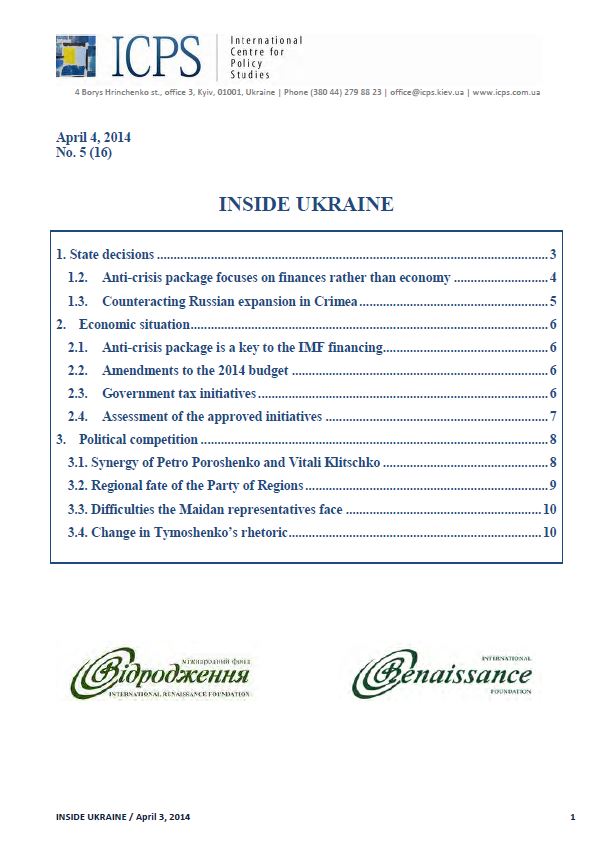
1. State decisions // 1.2. Anti-crisis package focuses on finances rather than economy // 1.3. Counteracting Russian expansion in Crimea // 2. Economic situation // 2.1. Anti-crisis package is a key to the IMF financing // 2.2. Amendments to the 2014 budget // 2.3. Government tax initiatives // 2.4. Assessment of the approved initiatives // 3. Political competition // 3.1. Synergy of Petro Poroshenko and Vitali Klitschko // 3.2. Regional fate of the Party of Regions // 3.3. Difficulties the Maidan representatives face // 3.4. Change in Tymoshenko’s rhetoric
More...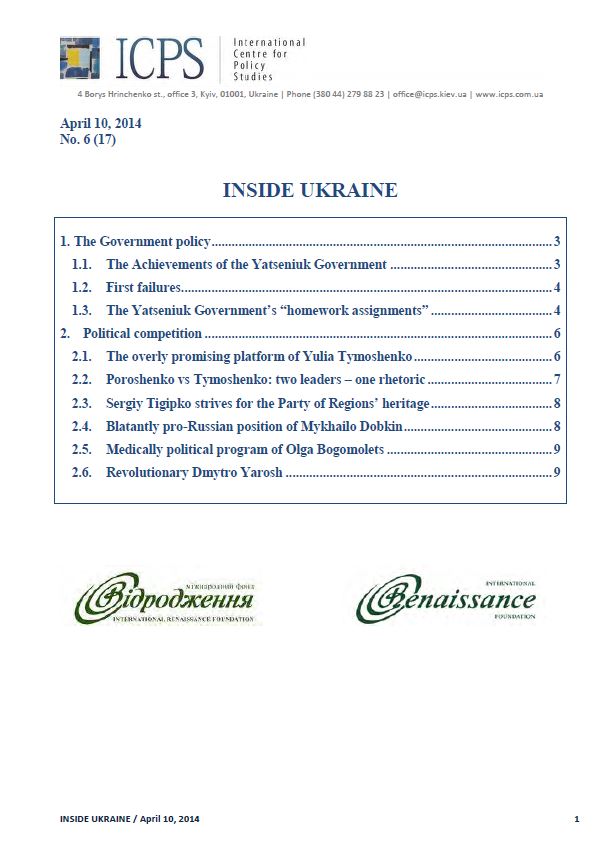
1. The Government policy // 1.1. The Achievements of the Yatseniuk Government // 1.2. First failures // 1.3. The Yatseniuk Government’s “homework assignments” // 2. Political competition // 2.1. The overly promising platform of Yulia Tymoshenko // 2.2. Poroshenko vs Tymoshenko: two leaders – one rhetoric // 2.3. Sergiy Tigipko strives for the Party of Regions’ heritage // 2.4. Blatantly pro-Russian position of Mykhailo Dobkin // 2.5. Medically political program of Olga Bogomolets // 2.6. Revolutionary Dmytro Yarosh
More...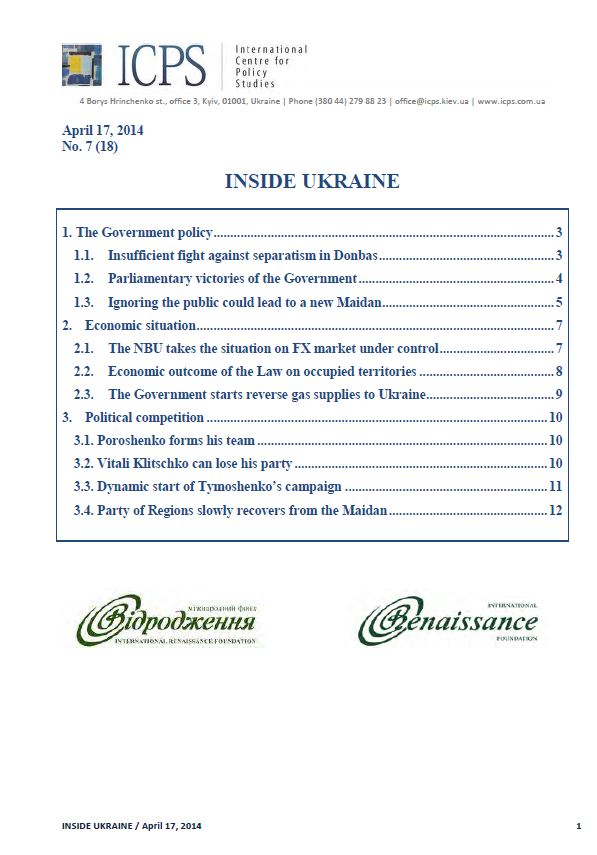
1. The Government policy // 1.1. Insufficient fight against separatism in Donbas // 1.2. Parliamentary victories of the Government // 1.3. Ignoring the public could lead to a new Maidan // 2. Economic situation // 2.1. The NBU takes the situation on FX market under control // 2.2. Economic outcome of the Law on occupied territories // 2.3. The Government starts reverse gas supplies to Ukraine // 3. Political competition // 3.1. Poroshenko forms his team // 3.2. Vitali Klitschko can lose his party // 3.3. Dynamic start of Tymoshenko’s campaign // 3.4. Party of Regions slowly recovers from the Maidan
More...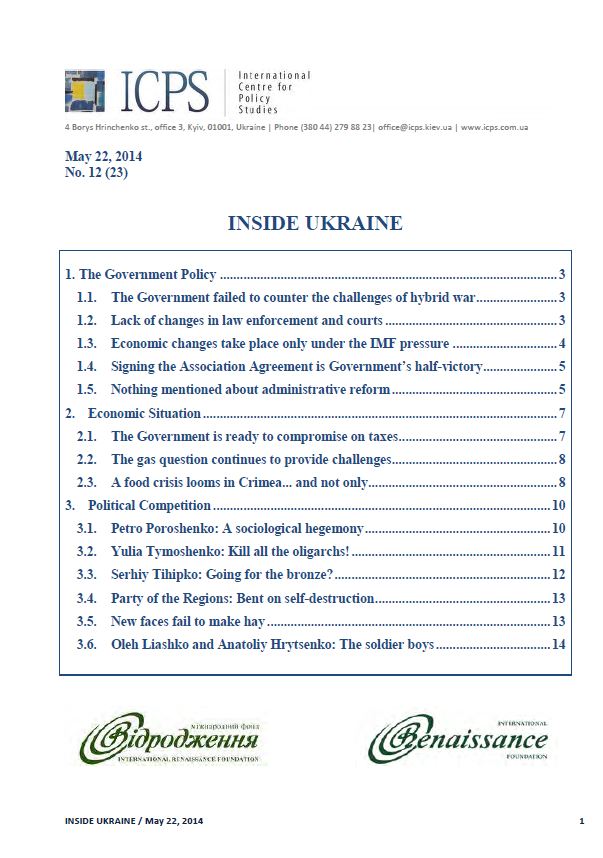
1. The Government Policy // 1.1. The Government failed to counter the challenges of hybrid war // 1.2. Lack of changes in law enforcement and courts // 1.3. Economic changes take place only under the IMF pressure // 1.4. Signing the Association Agreement is Government’s half-victory // 1.5. Nothing mentioned about administrative reform // 2. Economic Situation // 2.1. The Government is ready to compromise on taxes // 2.2. The gas question continues to provide challenges // 2.3. A food crisis looms in Crimea... and not only // 3. Political Competition // 3.1. Petro Poroshenko: A sociological hegemony // 3.2. Yulia Tymoshenko: Kill all the oligarchs! // 3.3. Serhiy Tihipko: Going for the bronze? // 3.4. Party of the Regions: Bent on self-destruction // 3.5. New faces fail to make hay // 3.6. Oleh Liashko and Anatoliy Hrytsenko: The soldier boys
More...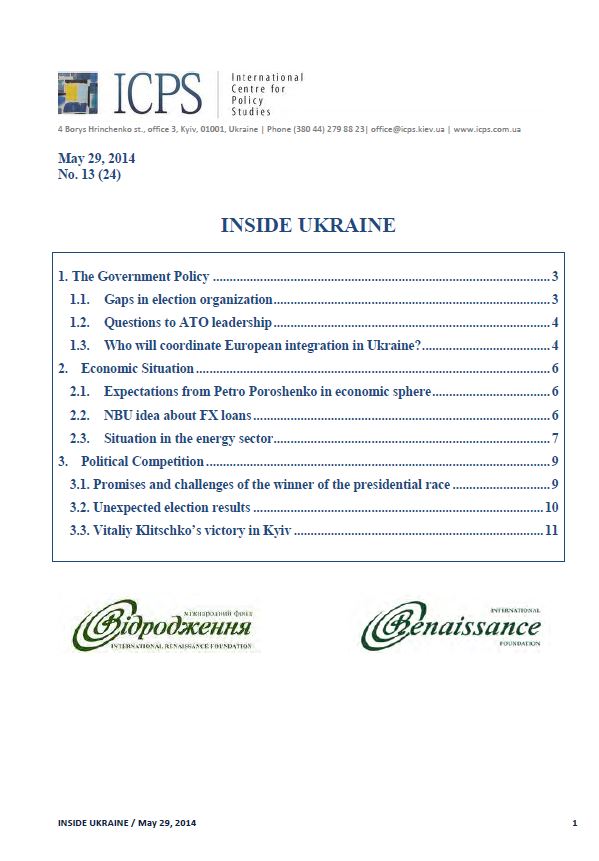
1. The Government Policy // 1.1. Gaps in election organization // 1.2. Questions to ATO leadership // 1.3. Who will coordinate European integration in Ukraine? // 2. Economic Situation // 2.1. Expectations from Petro Poroshenko in economic sphere // 2.2. NBU idea about FX loans // 2.3. Situation in the energy sector // 3. Political Competition // 3.1. Promises and challenges of the winner of the presidential race // 3.2. Unexpected election results // 3.3. Vitaliy Klitschko’s victory in Kyiv
More...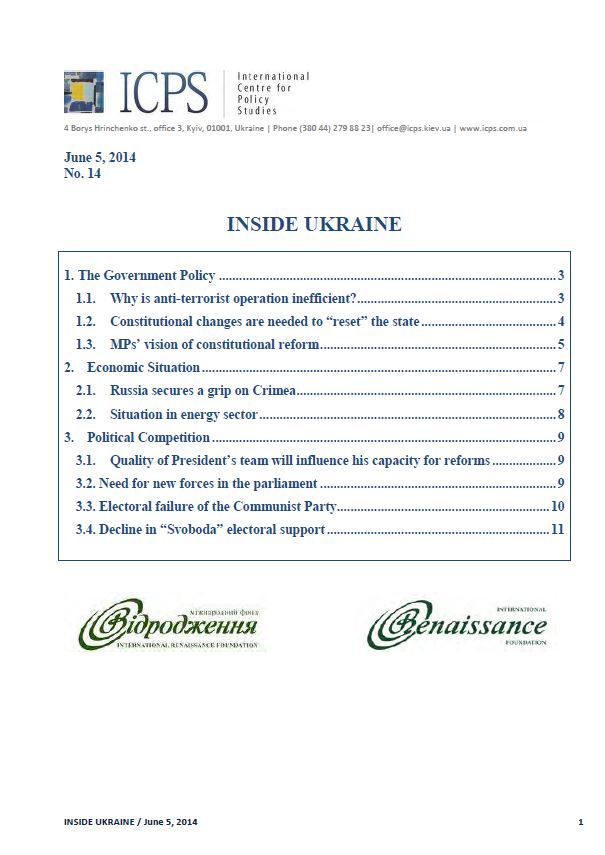
1. The Government Policy // 1.1. Why is anti-terrorist operation inefficient? // 1.2. Constitutional changes are needed to “reset” the state // 1.3. MPs’ vision of constitutional reform // 2. Economic Situation // 2.1. Russia secures a grip on Crimea // 2.2. Situation in energy sector // 3. Political Competition // 3.1. Quality of President’s team will influence his capacity for reforms // 3.2. Need for new forces in the parliament // 3.3. Electoral failure of the Communist Party // 3.4. Decline in “Svoboda” electoral support
More...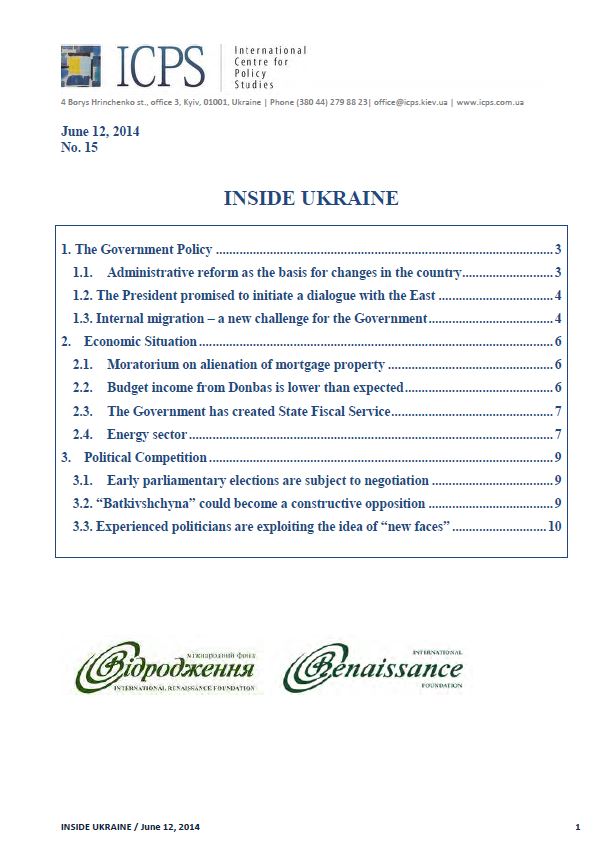
1. The Government Policy // 1.1. Administrative reform as the basis for changes in the country // 1.2. The President promised to initiate a dialogue with the East // 1.3. Internal migration – a new challenge for the Government // 2. Economic Situation // 2.1. Moratorium on alienation of mortgage property // 2.2. Budget income from Donbas is lower than expected // 2.3. The Government has created State Fiscal Service // 2.4. Energy sector // 3. Political Competition // 3.1. Early parliamentary elections are subject to negotiation // 3.2. “Batkivshchyna” could become a constructive opposition // 3.3. Experienced politicians are exploiting the idea of “new faces”
More...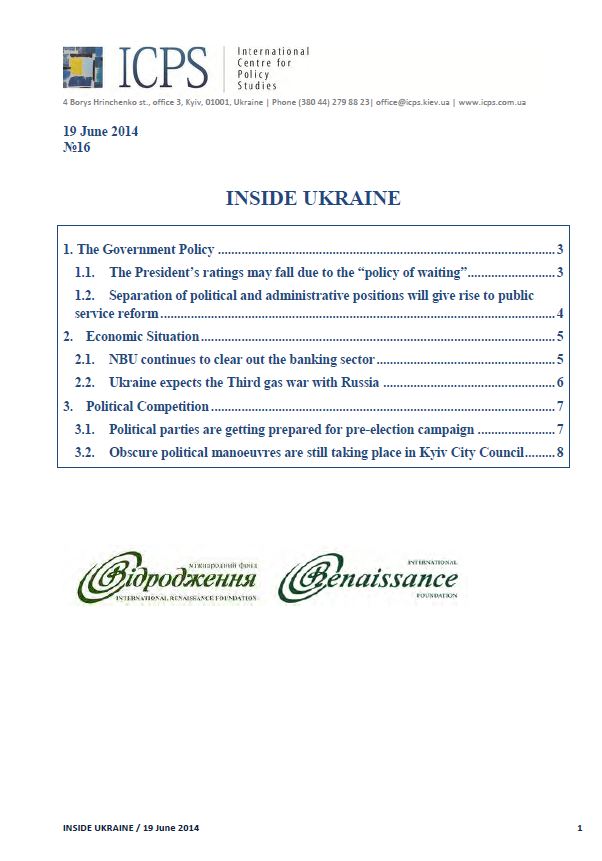
1. The Government Policy // 1.1. The President’s ratings may fall due to the “policy of waiting” // 1.2. Separation of political and administrative positions will give rise to public service reform // 2. Economic Situation // 2.1. NBU continues to clear out the banking sector // 2.2. Ukraine expects the Third gas war with Russia // 3. Political Competition // 3.1. Political parties are getting prepared for pre-election campaign // 3.2. Obscure political manoeuvres are still taking place in Kyiv City Council
More...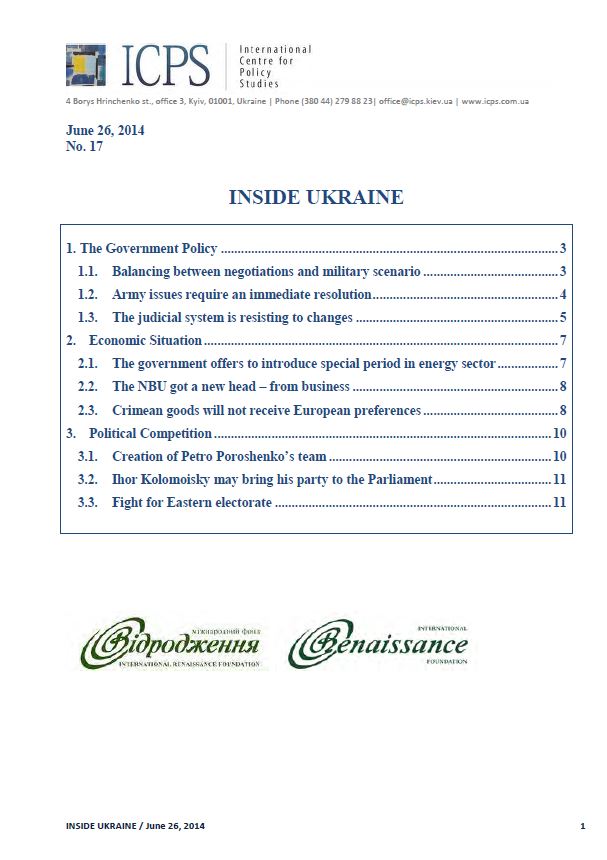
1. The Government Policy // 1.1. Balancing between negotiations and military scenario // 1.2. Army issues require an immediate resolution // 1.3. The judicial system is resisting to changes // 2. Economic Situation // 2.1. The government offers to introduce special period in energy sector // 2.2. The NBU got a new head – from business // 2.3. Crimean goods will not receive European preferences // 3. Political Competition // 3.1. Creation of Petro Poroshenko’s team // 3.2. Ihor Kolomoisky may bring his party to the Parliament // 3.3. Fight for Eastern electorate
More...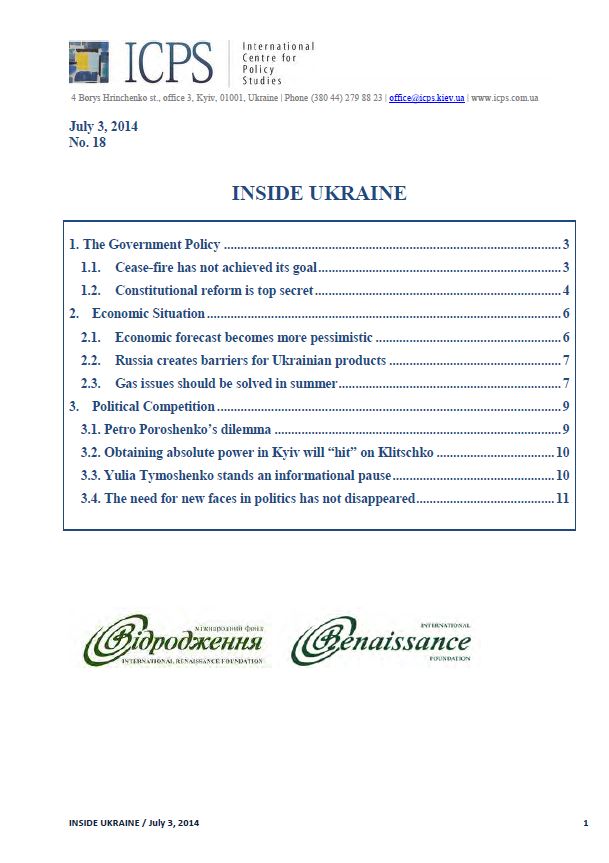
1. The Government Policy // 1.1. Cease-fire has not achieved its goal // 1.2. Constitutional reform is top secret // 2. Economic Situation // 2.1. Economic forecast becomes more pessimistic // 2.2. Russia creates barriers for Ukrainian products // 2.3. Gas issues should be solved in summer // 3. Political Competition // 3.1. Petro Poroshenko’s dilemma // 3.2. Obtaining absolute power in Kyiv will “hit” on Klitschko // 3.3. Yulia Tymoshenko stands an informational pause // 3.4. The need for new faces in politics has not disappeared
More...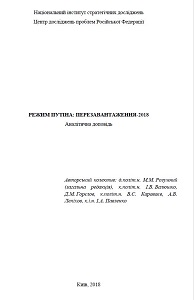
Keywords: Putin's Russia;
The end of 2017 - the beginning of 2018 passed quite predictably for Russia. The preparation for the presidential elections left a minimum of space for experiments and innovations in domestic and foreign policy. The regime quite consciously implemented an inertial scenario of preserving power, along the way only taking measures to avoid dangers and risks of destabilization. It can be said that during this period, the main security mechanisms were refined and established, thanks to which the current level of control of the situation in the country by the Kremlin was previously achieved and will continue to be maintained.
More...